高考英语二轮语法专题复习-倒装结构和省略
文档属性
| 名称 | 高考英语二轮语法专题复习-倒装结构和省略 | 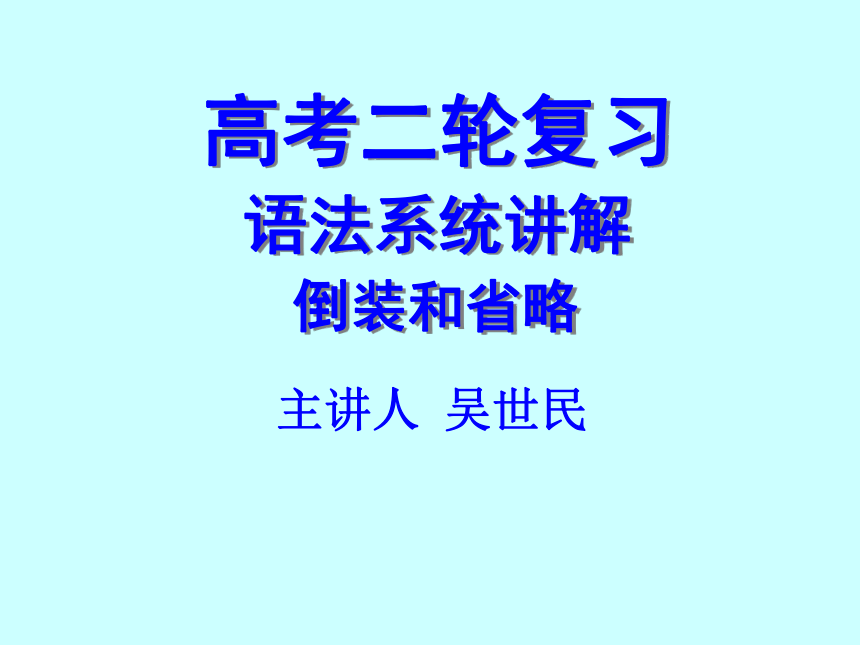 | |
| 格式 | rar | ||
| 文件大小 | 57.9KB | ||
| 资源类型 | 教案 | ||
| 版本资源 | 通用版 | ||
| 科目 | 英语 | ||
| 更新时间 | 2010-01-14 12:21:00 | ||
图片预览

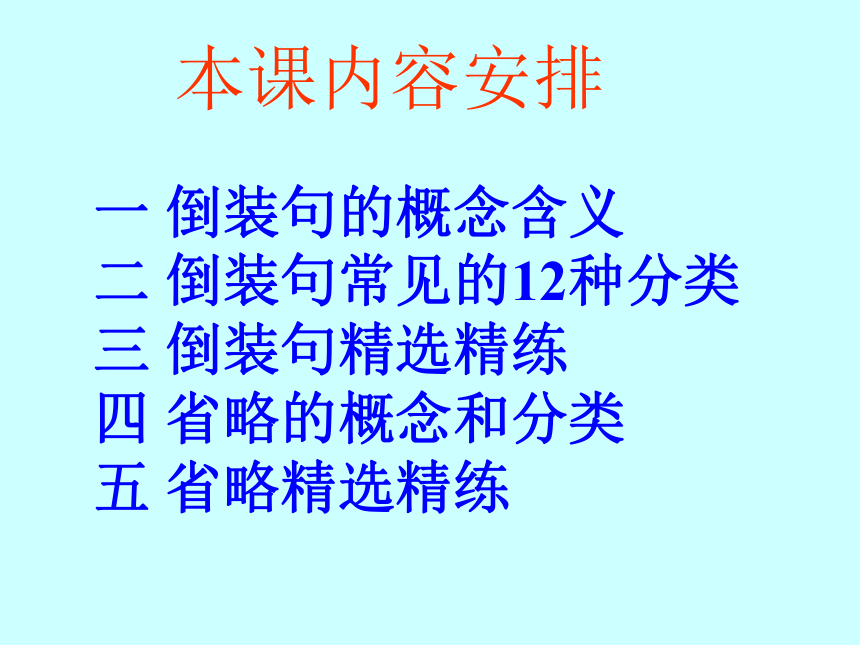

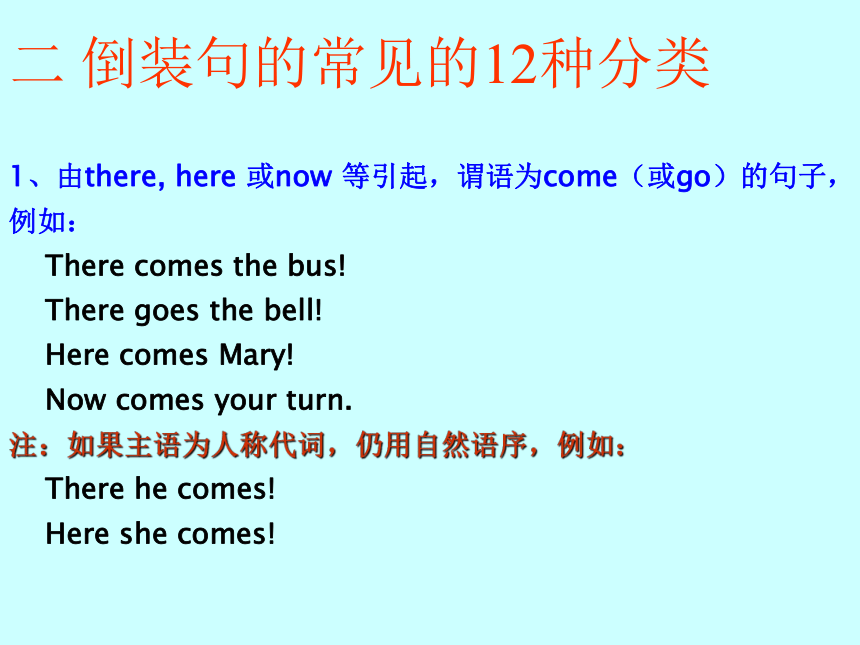
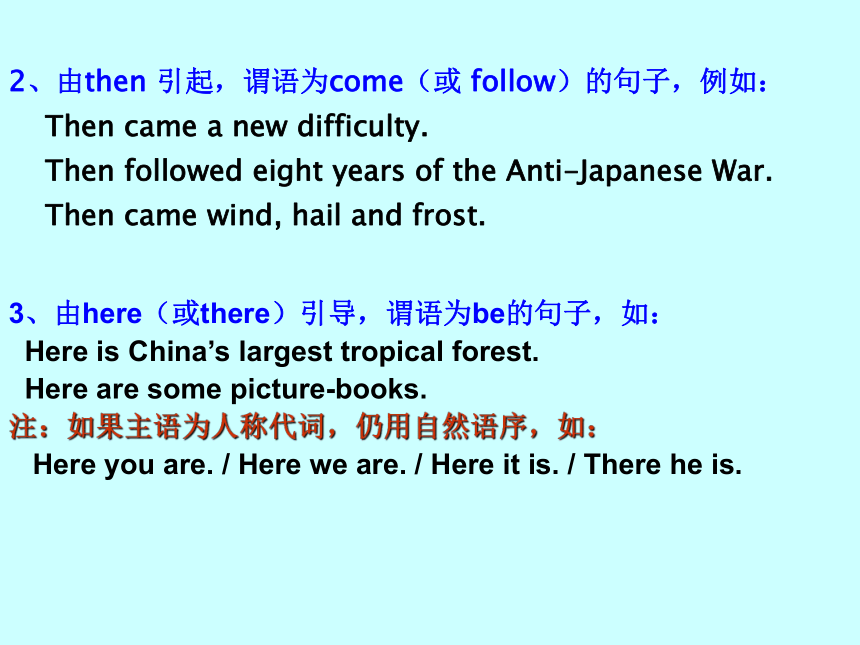
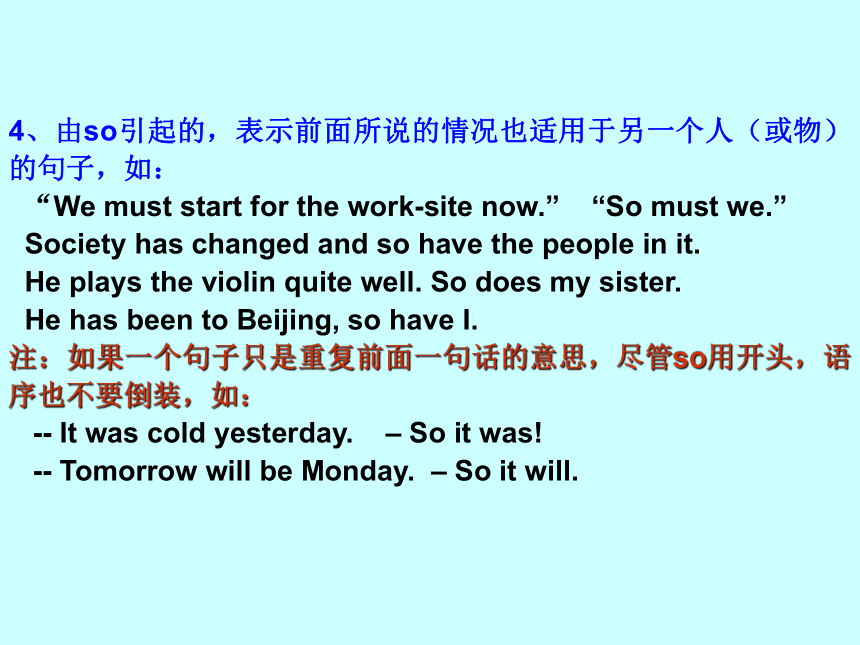
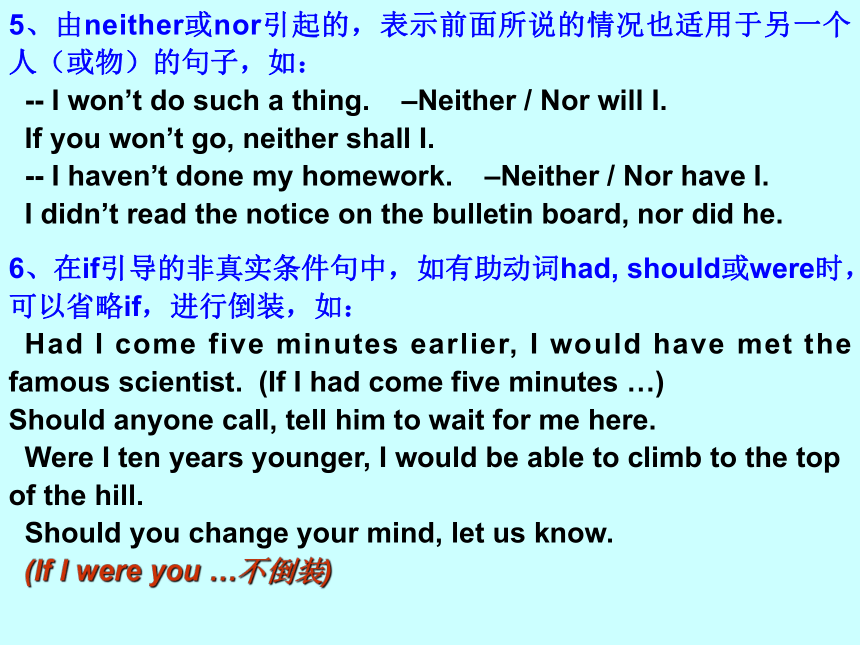
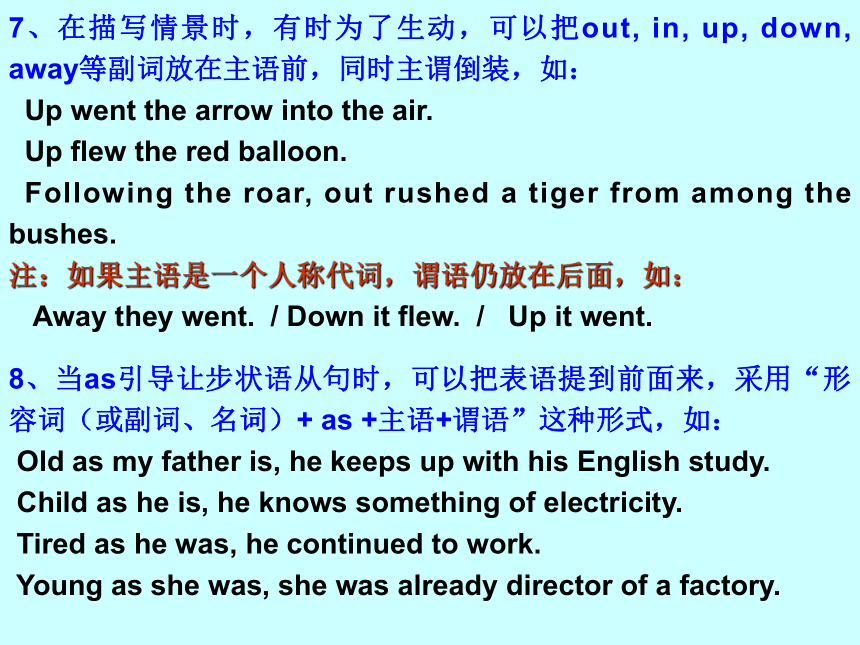
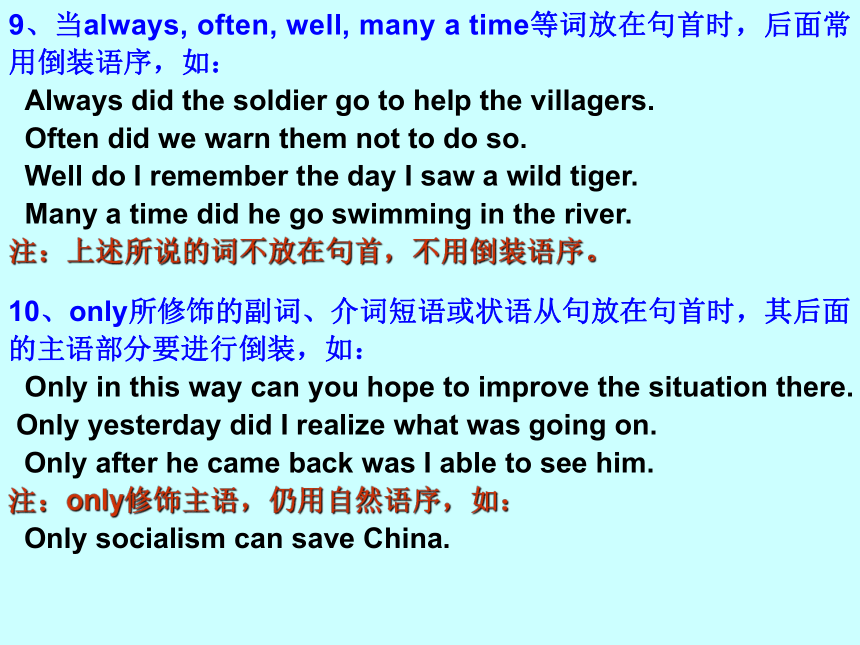
文档简介
课件28张PPT。 高考二轮复习 语法系统讲解 倒装和省略主讲人 吴世民本课内容安排一 倒装句的概念含义
二 倒装句常见的12种分类
三 倒装句精选精练
四 省略的概念和分类
五 省略精选精练 倒装语序分为“全部倒装”和“部分倒装”。在全部倒装的句子中,整个谓语都放在主语的前面;在部分倒装的句子中,只是谓语中的一部分(如助动词、情态动词或系动词be等)放在主语前面,其余部分仍放在主语后面。一 倒装句的概念二 倒装句的常见的12种分类1、由there, here 或now 等引起,谓语为come(或go)的句子,例如:
There comes the bus!
There goes the bell!
Here comes Mary!
Now comes your turn.
注:如果主语为人称代词,仍用自然语序,例如:
There he comes!
Here she comes!2、由then 引起,谓语为come(或 follow)的句子,例如:
Then came a new difficulty.
Then followed eight years of the Anti-Japanese War.
Then came wind, hail and frost.3、由here(或there)引导,谓语为be的句子,如:
Here is China’s largest tropical forest.
Here are some picture-books.
注:如果主语为人称代词,仍用自然语序,如:
Here you are. / Here we are. / Here it is. / There he is.4、由so引起的,表示前面所说的情况也适用于另一个人(或物)的句子,如:
“We must start for the work-site now.” “So must we.”
Society has changed and so have the people in it.
He plays the violin quite well. So does my sister.
He has been to Beijing, so have I.
注:如果一个句子只是重复前面一句话的意思,尽管so用开头,语序也不要倒装,如:
-- It was cold yesterday. – So it was!
-- Tomorrow will be Monday. – So it will. 5、由neither或nor引起的,表示前面所说的情况也适用于另一个人(或物)的句子,如:
-- I won’t do such a thing. –Neither / Nor will I.
If you won’t go, neither shall I.
-- I haven’t done my homework. –Neither / Nor have I.
I didn’t read the notice on the bulletin board, nor did he.6、在if引导的非真实条件句中,如有助动词had, should或were时,可以省略if,进行倒装,如:
Had I come five minutes earlier, I would have met the famous scientist. (If I had come five minutes …)
Should anyone call, tell him to wait for me here.
Were I ten years younger, I would be able to climb to the top of the hill.
Should you change your mind, let us know.
(If I were you …不倒装) 7、在描写情景时,有时为了生动,可以把out, in, up, down, away等副词放在主语前,同时主谓倒装,如:
Up went the arrow into the air.
Up flew the red balloon.
Following the roar, out rushed a tiger from among the bushes.
注:如果主语是一个人称代词,谓语仍放在后面,如:
Away they went. / Down it flew. / Up it went.8、当as引导让步状语从句时,可以把表语提到前面来,采用“形容词(或副词、名词)+ as +主语+谓语”这种形式,如:
Old as my father is, he keeps up with his English study.
Child as he is, he knows something of electricity.
Tired as he was, he continued to work.
Young as she was, she was already director of a factory. 9、当always, often, well, many a time等词放在句首时,后面常用倒装语序,如:
Always did the soldier go to help the villagers.
Often did we warn them not to do so.
Well do I remember the day I saw a wild tiger.
Many a time did he go swimming in the river.
注:上述所说的词不放在句首,不用倒装语序。10、only所修饰的副词、介词短语或状语从句放在句首时,其后面的主语部分要进行倒装,如:
Only in this way can you hope to improve the situation there.
Only yesterday did I realize what was going on.
Only after he came back was I able to see him.
注:only修饰主语,仍用自然语序,如:
Only socialism can save China. 11、含有否定意义的副词、连词或短语构成的状语放在句首时,常用倒装语序。
这些词和词组有:not, never, hardly, seldom, little, rarely, scarcely, not until, not only…but also…, neither…nor…, no sooner…than…, hardly…when …, scarcely…when等,例如:
Never shall I forget the day when I joined the League.
Not until I began to work did I realize how much time I had wasted.
Not only did he read the book, but also remembered what he had read.
No sooner had he arrived there than he fell ill.
Hardly / Scarcely had she fallen asleep when a knock at the door awakened her.
注:上面所说的词和词组如果不在句首,句子不必用倒装语序。另外,not only…but also连接两个主语时,不用倒装,如:
Not only the students, but also the teacher wishes for a holiday.12、当so(或such)…that…结构中的so或such用于句首时,要采取倒装语序,如:
So loudly did he speak that he was heard upstairs.
So small was the mark that I could hardly see it.
So angry was he that he couldn’t speak.
Such was his strength that he could bend iron bars.
注:such和be连用作表语时,也常用倒装语序,如:
Such was the result.
Such were her words.
Such was the story he told. 1.— Why can't I smoke here?
— At no time _______ in the meeting-room.
A. is smoking permitted B. smoking is permitted
C. smoking is it permitted D. does smoking permit答案A. 这是一个倒装问题。当否定词语置于句首以表示强调时,其句中的主谓须用倒装结构。这些否定词包括no, little, hardly, seldom, never, not only, not until等。本题的正常语序是 Smoking is permitted in the meeting-room at no time.2. Not until the early years of the 19th century _______ what heat is.
A. man did know B. man know
C. didn't man know D. did man know答案D. 看到Not until…的句型,我们知道为一倒装句,答案在C,D 中选一个。改写为正常语序为,Man did not know what heat is until the early years of the 19th. 现在将not提前,后面就不能再用否定了,否则意思就变了。 三 精选精练3. No sooner _______ than it began to rain heavily.
A. the game began B. has the game begun
C. did the game begin D. had the game begun答案D. 以具有否定意义的副词放在句首时,一般采用倒装句(谓语前置)。这类表示否定意义的词有never, seldom, scarcely, little, few, not, hardly, 以及not only…but (also), no sooner…than, hardly… when scarcely… when等等。注意:只有当Not only… but also连接两个分句时,才在第一个分句用倒装结构。如果置于句首的Not only… but also仅连接两个并列词语,不可用倒装结构。
Not only you but also I am fond of music.4.-- Do you know Jim quarrelled with his brother?
-- I don't know, _____.
A. nor don't I care B. nor do I care
C. I don't care neither D. I don't care also答案B。nor为增补意思"也不关心",因此句子应倒装。A.错在用 don't 再次否定,C. neither 用法不对且缺乏连词。D. 缺乏连词。注意:当so引出的句子用以对上文内容加以证实或肯定时,不可用倒装结构。意为"的确如此"。
Tom asked me to go to play football and so I did.
“It's raining hard.” “So it is.”
5. Not until the early years of the 19th century ______ what heat is.
A. man did know B. man knew
C. didn't man know D. did man know
答案为D。 Not until 引导的词组位于句首,后面的句子要倒装。
6. Not until I began to work ______ how much time I had wasted.
A. didn't I realize B. did I realize
C. I didn't realize D. I realize
答案为B。 Not until 引导从句位于句首,后面的主句要倒装。 省略
为了使讲话和行文简洁,句中某些成分有时可省略。省略可分以下几种情况:一 简单句中的省略
二 并列句中的省略
三 复合句中的省略
四 其他情况的省略一 简单句中的省略
1、省略主语:祈使句中主语通常省略。
其它省略主语多限于少数现成的说法。
e.g. (I) Thank you for your help.(括号内为省略的词语,下同)
(I) See you tomorrow.
(It) Doesn’t matter.
2、省略主谓语或主谓语的一部分。
e.g. (There is) No smoking.
(Is there) Anything wrong?
Why (do you) not say hello to him?3、省略作宾语的不定式短语,只保留to。
e.g. ---- Are you going there?
---- I’d like to (go there).
He did not give me the chance, though he had
promised to (give me the chance).
(动词:want, wish, expect, hope, like, love, try, forget, decide,
prefer, mean, intend, plan, refuse…等动词宾语。
tell, ask, want, expect, warn…等动词的宾补。
形容词: glad, happy, pleased, delighted, …
短语:be going to, be about to, be able to, have to, used to,
ought to, …)
注意:如果该宾语是be动词或完成时态,
则须在to之后加上be或have。
e.g. ---- Are you an engineer?
---- No, but I want to be.
---- He hasn’t finished the task yet.
---- Well, he ought to have.4、省略表语。
e.g. ---- Are you thirsty?
---- Yes, I am (thirsty).
5、感叹句根据上下文的省略。
e.g. What a wonderful film (it is)!
(It’s) Simply impossible!
6、介词的省略:
e.g. The old man had no difficulty (in ) finding his house.
一些固定词组: have a hard time (in) doing sth.
waste time (in) doing sth., spend …(in) doing sth.
prevent/stop…(from)…, be busy (in) doing…,
be engaged (in) doing…, there’s no use (in) doing…,…
He failed (in) the game.
The war lasted (for) four years. (但在句首和与walk等连用不可)
Come and see me (at) any time you like. (in, on, at, by)
He stayed (at) home all day.
He walked (for ) three li. (表示距离的状语中)
(In) This way you will succeed.7、名词所有格后面的名词,如果是表示住宅,店铺,
教堂或者上下文已经暗示或明确指出过的事物时常省略。
e.g. At her sister’s (house), she spent a pleasant weekend.
8、 连词的省略:
not only… but (also)…, whether… (or not), so (that)
9、情态动词should的省略
insist, order, command, suggest, propose, advise,
demand, require, request, ask.
It’s necessary/important/impossible/strange/ natural/a pity…
10、同时省略几个成分。
e.g. Let’s meet at the same place as (we met) yesterday.
---- Have you finished your work?
---- (I have) Not (finished my work) yet.
二 并列句中的省略
两个并列分句中,后一个分句常省略与前一分句中
相同的部分。
e.g. My father is a doctor and my mother (is) a nurse.
I study at college and my sister (studies) at high school.三 主从复合句中的省略
1、主句中有一些成分被省略。
e.g. (I’m) Sorry to hear that you are ill.
(It is a) Pity that he missed such a good chance.
2、省略了一个从句或从句的一部分,用so或not
(切不可用it或that)代替。
e.g. ---- Is he coming back tonight?
---- I think so.
---- Is he feeling better today?
---- I’m afraid not.
这种用法常见的有:How so? Why so? Is that so?
I hope so. He said so 及I suppose not. I believed not.
I imagine not. I expect not. I hope not. I guess not等。
(但I don’t think so比I think not更常用)。四 其它省略
1、连词that的省略:
①、宾语从句中常省略连词that,但也有不能省略的情况
be+某些形容词( afraid, sure, sorry, certain, glad…);
两个(或两个以上)宾语从句并列时;
He said that, if he could manage it, he would come for dinner.
②、在定语从句中,that在从句中作宾语/表语/There be
结构的主语时可省略。
I’m not the man (that) I was when you knew me first.
This is the fastest train (that) there is to Beijing.
This is the best way (that) we should choose.
I don’t like the way (that)/in which he talks to his parents.
③、引导主语从句、同位语从句等的连词that一般不可省略。
在表语从句中偶尔可省略。
What they want to do is (that) they go to play basketball.2、不定式符号to的省略
①、并列的不定式可省去后面的to。
e.g. I told him to sit down and wait for a moment.
To be for the plan or to be against the plan doesn’t matter.
②、当不定式作表语时,如果前面主语中出现实义动词do及各种形式,
则不定式可省略。
What he wants to do is (to) go home.
③ 、某些使役动词(如let, make, have)及感官动词
(如see, watch, notice, hear, feel, look at和listen to等)
后面作宾语补足语的不定式一定要省去to,
但在被动语态中须把to加上。
e.g. ---- I saw the boy fall from the tree.
---- The boy was seen to fall from the tree.
④、介词but/except/besides前若有动词do,后面的不定式不带to。
e.g. The boy did nothing but play.3、在某些状语从句中,从句的主语(或it)与主句主语
一致时,可省去“主语 + be”部分或从句的主语it。
(参看“状语从句”有关部分)
Look out for cars when crossing the street.
Fill in the blanks with articles where necessary.
She worked extremely hard though still rather poor in health.
在比较状语从句中,than或as后面的部分可省略。
Tom plays football as well as, if not better than, Jack.
(=Tom plays football as well as Jack does, if he doesn’t
play better than Jack does.)
We should think more of our class than of ourselves.
4、连词if在部分虚拟条件句中可省略,
但后面的语序有变化(参见“倒装句”有关部分)
5、主句与从句各有一些成分省略。
e.g. The sooner (you do it), the better (it will be).1. It shames me to say it, but I told a lie when ____ at the meeting
by my boss.
questioning B. having questioned
C. questioned D. to be questioned
2. What surprised me was not what he said but ____ he said it.
the way B. in the way that C. in the way D. the way which
解析: C when引导时间状语从句时,如果从句的主语与主句的主语相同,且从句谓语中含有be时,可以省略从句的主语和be。本句在when后面省略了were。解析:A way表示“方式”、“手段”、“方法”时,后面的定语从句用
that或in which引导,其中that或in which可以省略。本句在he said it
前省略了that或in which。3. — Susan, will you please go and empty that drawer?
— ____?
A. What for B. What is it C. How is it D. How come
4. I’m looking forward as much to her return as she herself to ____ me.
have seen B. seeing C. meet D. be met
解析:A 答者不知为何要倒空抽屉,所以问为什么。故需选
What for?它是What are you going to use the(empty) drawer for?
的省略。解析:B本句是...
as she herself (is looking forward) to seeing me的省略。5. Who can you turn to in time of danger, if not ____?
ourselves B. ours C. we D. us
6. — Did you visit the museum last week?
— No, we ____, but we spent too much time shopping.
could have B. could C. must have D. must
解析:D if not us是if you don’t turn to us的省略。
解析:A 本句为...we could have visited it...的省略。
二 倒装句常见的12种分类
三 倒装句精选精练
四 省略的概念和分类
五 省略精选精练 倒装语序分为“全部倒装”和“部分倒装”。在全部倒装的句子中,整个谓语都放在主语的前面;在部分倒装的句子中,只是谓语中的一部分(如助动词、情态动词或系动词be等)放在主语前面,其余部分仍放在主语后面。一 倒装句的概念二 倒装句的常见的12种分类1、由there, here 或now 等引起,谓语为come(或go)的句子,例如:
There comes the bus!
There goes the bell!
Here comes Mary!
Now comes your turn.
注:如果主语为人称代词,仍用自然语序,例如:
There he comes!
Here she comes!2、由then 引起,谓语为come(或 follow)的句子,例如:
Then came a new difficulty.
Then followed eight years of the Anti-Japanese War.
Then came wind, hail and frost.3、由here(或there)引导,谓语为be的句子,如:
Here is China’s largest tropical forest.
Here are some picture-books.
注:如果主语为人称代词,仍用自然语序,如:
Here you are. / Here we are. / Here it is. / There he is.4、由so引起的,表示前面所说的情况也适用于另一个人(或物)的句子,如:
“We must start for the work-site now.” “So must we.”
Society has changed and so have the people in it.
He plays the violin quite well. So does my sister.
He has been to Beijing, so have I.
注:如果一个句子只是重复前面一句话的意思,尽管so用开头,语序也不要倒装,如:
-- It was cold yesterday. – So it was!
-- Tomorrow will be Monday. – So it will. 5、由neither或nor引起的,表示前面所说的情况也适用于另一个人(或物)的句子,如:
-- I won’t do such a thing. –Neither / Nor will I.
If you won’t go, neither shall I.
-- I haven’t done my homework. –Neither / Nor have I.
I didn’t read the notice on the bulletin board, nor did he.6、在if引导的非真实条件句中,如有助动词had, should或were时,可以省略if,进行倒装,如:
Had I come five minutes earlier, I would have met the famous scientist. (If I had come five minutes …)
Should anyone call, tell him to wait for me here.
Were I ten years younger, I would be able to climb to the top of the hill.
Should you change your mind, let us know.
(If I were you …不倒装) 7、在描写情景时,有时为了生动,可以把out, in, up, down, away等副词放在主语前,同时主谓倒装,如:
Up went the arrow into the air.
Up flew the red balloon.
Following the roar, out rushed a tiger from among the bushes.
注:如果主语是一个人称代词,谓语仍放在后面,如:
Away they went. / Down it flew. / Up it went.8、当as引导让步状语从句时,可以把表语提到前面来,采用“形容词(或副词、名词)+ as +主语+谓语”这种形式,如:
Old as my father is, he keeps up with his English study.
Child as he is, he knows something of electricity.
Tired as he was, he continued to work.
Young as she was, she was already director of a factory. 9、当always, often, well, many a time等词放在句首时,后面常用倒装语序,如:
Always did the soldier go to help the villagers.
Often did we warn them not to do so.
Well do I remember the day I saw a wild tiger.
Many a time did he go swimming in the river.
注:上述所说的词不放在句首,不用倒装语序。10、only所修饰的副词、介词短语或状语从句放在句首时,其后面的主语部分要进行倒装,如:
Only in this way can you hope to improve the situation there.
Only yesterday did I realize what was going on.
Only after he came back was I able to see him.
注:only修饰主语,仍用自然语序,如:
Only socialism can save China. 11、含有否定意义的副词、连词或短语构成的状语放在句首时,常用倒装语序。
这些词和词组有:not, never, hardly, seldom, little, rarely, scarcely, not until, not only…but also…, neither…nor…, no sooner…than…, hardly…when …, scarcely…when等,例如:
Never shall I forget the day when I joined the League.
Not until I began to work did I realize how much time I had wasted.
Not only did he read the book, but also remembered what he had read.
No sooner had he arrived there than he fell ill.
Hardly / Scarcely had she fallen asleep when a knock at the door awakened her.
注:上面所说的词和词组如果不在句首,句子不必用倒装语序。另外,not only…but also连接两个主语时,不用倒装,如:
Not only the students, but also the teacher wishes for a holiday.12、当so(或such)…that…结构中的so或such用于句首时,要采取倒装语序,如:
So loudly did he speak that he was heard upstairs.
So small was the mark that I could hardly see it.
So angry was he that he couldn’t speak.
Such was his strength that he could bend iron bars.
注:such和be连用作表语时,也常用倒装语序,如:
Such was the result.
Such were her words.
Such was the story he told. 1.— Why can't I smoke here?
— At no time _______ in the meeting-room.
A. is smoking permitted B. smoking is permitted
C. smoking is it permitted D. does smoking permit答案A. 这是一个倒装问题。当否定词语置于句首以表示强调时,其句中的主谓须用倒装结构。这些否定词包括no, little, hardly, seldom, never, not only, not until等。本题的正常语序是 Smoking is permitted in the meeting-room at no time.2. Not until the early years of the 19th century _______ what heat is.
A. man did know B. man know
C. didn't man know D. did man know答案D. 看到Not until…的句型,我们知道为一倒装句,答案在C,D 中选一个。改写为正常语序为,Man did not know what heat is until the early years of the 19th. 现在将not提前,后面就不能再用否定了,否则意思就变了。 三 精选精练3. No sooner _______ than it began to rain heavily.
A. the game began B. has the game begun
C. did the game begin D. had the game begun答案D. 以具有否定意义的副词放在句首时,一般采用倒装句(谓语前置)。这类表示否定意义的词有never, seldom, scarcely, little, few, not, hardly, 以及not only…but (also), no sooner…than, hardly… when scarcely… when等等。注意:只有当Not only… but also连接两个分句时,才在第一个分句用倒装结构。如果置于句首的Not only… but also仅连接两个并列词语,不可用倒装结构。
Not only you but also I am fond of music.4.-- Do you know Jim quarrelled with his brother?
-- I don't know, _____.
A. nor don't I care B. nor do I care
C. I don't care neither D. I don't care also答案B。nor为增补意思"也不关心",因此句子应倒装。A.错在用 don't 再次否定,C. neither 用法不对且缺乏连词。D. 缺乏连词。注意:当so引出的句子用以对上文内容加以证实或肯定时,不可用倒装结构。意为"的确如此"。
Tom asked me to go to play football and so I did.
“It's raining hard.” “So it is.”
5. Not until the early years of the 19th century ______ what heat is.
A. man did know B. man knew
C. didn't man know D. did man know
答案为D。 Not until 引导的词组位于句首,后面的句子要倒装。
6. Not until I began to work ______ how much time I had wasted.
A. didn't I realize B. did I realize
C. I didn't realize D. I realize
答案为B。 Not until 引导从句位于句首,后面的主句要倒装。 省略
为了使讲话和行文简洁,句中某些成分有时可省略。省略可分以下几种情况:一 简单句中的省略
二 并列句中的省略
三 复合句中的省略
四 其他情况的省略一 简单句中的省略
1、省略主语:祈使句中主语通常省略。
其它省略主语多限于少数现成的说法。
e.g. (I) Thank you for your help.(括号内为省略的词语,下同)
(I) See you tomorrow.
(It) Doesn’t matter.
2、省略主谓语或主谓语的一部分。
e.g. (There is) No smoking.
(Is there) Anything wrong?
Why (do you) not say hello to him?3、省略作宾语的不定式短语,只保留to。
e.g. ---- Are you going there?
---- I’d like to (go there).
He did not give me the chance, though he had
promised to (give me the chance).
(动词:want, wish, expect, hope, like, love, try, forget, decide,
prefer, mean, intend, plan, refuse…等动词宾语。
tell, ask, want, expect, warn…等动词的宾补。
形容词: glad, happy, pleased, delighted, …
短语:be going to, be about to, be able to, have to, used to,
ought to, …)
注意:如果该宾语是be动词或完成时态,
则须在to之后加上be或have。
e.g. ---- Are you an engineer?
---- No, but I want to be.
---- He hasn’t finished the task yet.
---- Well, he ought to have.4、省略表语。
e.g. ---- Are you thirsty?
---- Yes, I am (thirsty).
5、感叹句根据上下文的省略。
e.g. What a wonderful film (it is)!
(It’s) Simply impossible!
6、介词的省略:
e.g. The old man had no difficulty (in ) finding his house.
一些固定词组: have a hard time (in) doing sth.
waste time (in) doing sth., spend …(in) doing sth.
prevent/stop…(from)…, be busy (in) doing…,
be engaged (in) doing…, there’s no use (in) doing…,…
He failed (in) the game.
The war lasted (for) four years. (但在句首和与walk等连用不可)
Come and see me (at) any time you like. (in, on, at, by)
He stayed (at) home all day.
He walked (for ) three li. (表示距离的状语中)
(In) This way you will succeed.7、名词所有格后面的名词,如果是表示住宅,店铺,
教堂或者上下文已经暗示或明确指出过的事物时常省略。
e.g. At her sister’s (house), she spent a pleasant weekend.
8、 连词的省略:
not only… but (also)…, whether… (or not), so (that)
9、情态动词should的省略
insist, order, command, suggest, propose, advise,
demand, require, request, ask.
It’s necessary/important/impossible/strange/ natural/a pity…
10、同时省略几个成分。
e.g. Let’s meet at the same place as (we met) yesterday.
---- Have you finished your work?
---- (I have) Not (finished my work) yet.
二 并列句中的省略
两个并列分句中,后一个分句常省略与前一分句中
相同的部分。
e.g. My father is a doctor and my mother (is) a nurse.
I study at college and my sister (studies) at high school.三 主从复合句中的省略
1、主句中有一些成分被省略。
e.g. (I’m) Sorry to hear that you are ill.
(It is a) Pity that he missed such a good chance.
2、省略了一个从句或从句的一部分,用so或not
(切不可用it或that)代替。
e.g. ---- Is he coming back tonight?
---- I think so.
---- Is he feeling better today?
---- I’m afraid not.
这种用法常见的有:How so? Why so? Is that so?
I hope so. He said so 及I suppose not. I believed not.
I imagine not. I expect not. I hope not. I guess not等。
(但I don’t think so比I think not更常用)。四 其它省略
1、连词that的省略:
①、宾语从句中常省略连词that,但也有不能省略的情况
be+某些形容词( afraid, sure, sorry, certain, glad…);
两个(或两个以上)宾语从句并列时;
He said that, if he could manage it, he would come for dinner.
②、在定语从句中,that在从句中作宾语/表语/There be
结构的主语时可省略。
I’m not the man (that) I was when you knew me first.
This is the fastest train (that) there is to Beijing.
This is the best way (that) we should choose.
I don’t like the way (that)/in which he talks to his parents.
③、引导主语从句、同位语从句等的连词that一般不可省略。
在表语从句中偶尔可省略。
What they want to do is (that) they go to play basketball.2、不定式符号to的省略
①、并列的不定式可省去后面的to。
e.g. I told him to sit down and wait for a moment.
To be for the plan or to be against the plan doesn’t matter.
②、当不定式作表语时,如果前面主语中出现实义动词do及各种形式,
则不定式可省略。
What he wants to do is (to) go home.
③ 、某些使役动词(如let, make, have)及感官动词
(如see, watch, notice, hear, feel, look at和listen to等)
后面作宾语补足语的不定式一定要省去to,
但在被动语态中须把to加上。
e.g. ---- I saw the boy fall from the tree.
---- The boy was seen to fall from the tree.
④、介词but/except/besides前若有动词do,后面的不定式不带to。
e.g. The boy did nothing but play.3、在某些状语从句中,从句的主语(或it)与主句主语
一致时,可省去“主语 + be”部分或从句的主语it。
(参看“状语从句”有关部分)
Look out for cars when crossing the street.
Fill in the blanks with articles where necessary.
She worked extremely hard though still rather poor in health.
在比较状语从句中,than或as后面的部分可省略。
Tom plays football as well as, if not better than, Jack.
(=Tom plays football as well as Jack does, if he doesn’t
play better than Jack does.)
We should think more of our class than of ourselves.
4、连词if在部分虚拟条件句中可省略,
但后面的语序有变化(参见“倒装句”有关部分)
5、主句与从句各有一些成分省略。
e.g. The sooner (you do it), the better (it will be).1. It shames me to say it, but I told a lie when ____ at the meeting
by my boss.
questioning B. having questioned
C. questioned D. to be questioned
2. What surprised me was not what he said but ____ he said it.
the way B. in the way that C. in the way D. the way which
解析: C when引导时间状语从句时,如果从句的主语与主句的主语相同,且从句谓语中含有be时,可以省略从句的主语和be。本句在when后面省略了were。解析:A way表示“方式”、“手段”、“方法”时,后面的定语从句用
that或in which引导,其中that或in which可以省略。本句在he said it
前省略了that或in which。3. — Susan, will you please go and empty that drawer?
— ____?
A. What for B. What is it C. How is it D. How come
4. I’m looking forward as much to her return as she herself to ____ me.
have seen B. seeing C. meet D. be met
解析:A 答者不知为何要倒空抽屉,所以问为什么。故需选
What for?它是What are you going to use the(empty) drawer for?
的省略。解析:B本句是...
as she herself (is looking forward) to seeing me的省略。5. Who can you turn to in time of danger, if not ____?
ourselves B. ours C. we D. us
6. — Did you visit the museum last week?
— No, we ____, but we spent too much time shopping.
could have B. could C. must have D. must
解析:D if not us是if you don’t turn to us的省略。
解析:A 本句为...we could have visited it...的省略。
